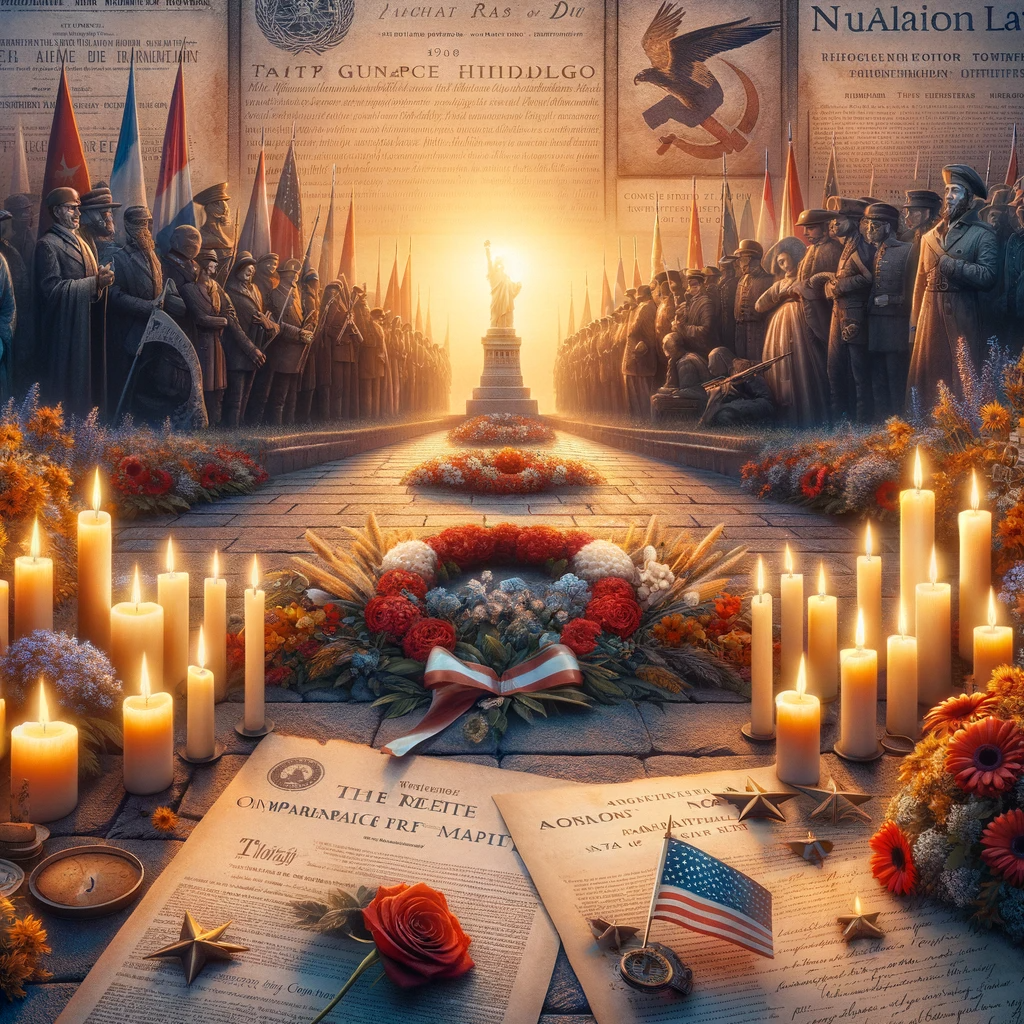On This Day 2 February 2024 Friday
“On This Day 2 February” serves as a poignant reminder of the historical tapestry woven through time, capturing the essence of pivotal moments that have shaped our world. From the courageous sacrifices of freedom fighters to landmark battles, and from transformative political agreements to cultural milestones, this key phrase invites us to delve into the depths of history. It beckons us to reflect on the significant events that occurred on this specific date across different years, underscoring the perpetual impact of past actions on our present and future.
Sam Vikram: 2080 Purnimanta Mass: Magha Paksha: Tithi: Krishna Paksha Saptami
 Panchang / पंचांग
Panchang / पंचांग
Virram Samvat / विरम संवत: 2080
Shaka Samvat / शक संवत: 1945
Amanta Month / अमान्त मास: Pausa
Purnimanta / पूर्णिमांत: Magha
Tithi / तिथि: Krishna Paksha Saptami
Today/ आज
Festivals Today: Kaalaashtamee
Festials Tomorrow:
Day Today: World Wetlands Day (A/RES/75/317)
Day Tomorrow:
Yoga / योग:
Soola – Feb 01 12:27 PM – Feb 02 12:54 PM
Ganda – Feb 02 12:54 PM – Feb 03 12:51 PM
Karana / करण:
Kaulava: 04:47 AM – Feb 03 05:21 PM
Taitila: 05:21 PM – Feb 04 05:42 AM
Garija: 05:42 AM – Feb 04 05:50 PM”
Sunrise / सूर्योदय: 7:13
Sunset / सूर्यास्त: 17:56
Moonrise / चंद्रोदय: 0:44
Moonset / चंद्रास्त: 11:40
 Auspicious Time / शुभ समय
Auspicious Time / शुभ समय
![]() Inauspicious Time / अशुभ समय
Inauspicious Time / अशुभ समय
Rahu – 11:14 AM – 12:34 PM
Yamaganda – 3:15 PM – 4:35 PM
Gulika – 8:33 AM – 9:53 AM
Dur Muhurat – 09:21 AM – 10:04 AM, 12:56 PM – 01:38 PM
Varjyam – 09:55 AM – 11:39 AM
Information Source: https://www.prokerala.com/
Today / आज
Freedom Fighters sacrificed / राष्ट्रवादियों ने बलिदान दिया था At Least/ कम से कम: 2
Major Historical Events
2 February 1509 – The Battle of Diu:
“On 2 and 3 February 1509, the Battle of Diu was fought near Diu, India, decisively establishing Portuguese control over the Indian Ocean trade routes and marking a pivotal moment in the age of naval warfare between Portugal and the Ottoman Empire.”
On 2 February 1834 Martandrao Malharrao Holkar Rule Ended:
A significant change occurred within the leadership or governance related to Martandrao Malharrao Holkar, possibly marking the end of his influence or tenure in the context of Scindia and Gwalior State. This date may signify a transition or an important event in the political dynamics of the region, reflecting the complex history of leadership and power struggles among the princely states of India during the colonial period.
On 2 February 1994, marking a pivotal moment in its history, NATO, under the predominant influence of the United States, undertook its first combat operation by enforcing a no-fly zone. This action saw American fighters engaging and shooting down four Bosnian Serb aircraft, illustrating a decisive and forceful display of military capability by the US within the NATO framework. The event underscored the United States’ leading role in international military interventions and its readiness to exercise unilateral power in global conflicts.
Historical Events in Brief on this day
2 February 1844 – USS Princeton disaster: The tragic explosion aboard the USS Princeton on 2 February 1844 during a demonstration of naval firepower resulted in the death of several U.S. officials and narrowly missed impacting President John Tyler.
2 February 1848 – Treaty of Guadalupe Hidalgo: The signing of the Treaty of Guadalupe Hidalgo on 2 February 1848 ended the U.S.-Mexico war, leading to a significant territorial expansion for the United States in exchange for $15 million.
2 February 1848 – Publication of the Communist Manifesto: Karl Marx and Friedrich Engels published the Communist Manifesto on 2 February 1848, advocating for the abolition of private property and a society where workers would own the means of production.
2 February 1942 – First attack on the U.S. mainland in WWII: A Japanese submarine’s shelling of an oil refinery near Santa Barbara, California, on 2 February 1942 marked the first attack on the U.S. mainland during World War II, causing minor damage.
2 February 1943 – Battle of Kasserine Pass: German Field Marshal Erwin Rommel broke through American lines at Kasserine Pass in North Africa on 2 February 1943, in a harsh introduction to World War II in Europe for inexperienced U.S. troops, resulting in significant American casualties.
2 February 1972 – President Nixon’s Visit to China: President Richard Nixon’s arrival in China on 2 February 1972 for historic meetings with Chairman Mao and Premier Chou En-lai marked the beginning of a new era in Sino-American relations.
2 February 1982 – Hama Massacre: The Hama massacre began on 2 February 1982, a brutal conflict between the Syrian government and the Muslim Brotherhood, resulting in a decisive Syrian victory and an estimated 10,000 deaths, marking one of the darkest moments in Syria’s modern history.
2 February 1986 – The Dalai Lama met with Pope John Paul II: This historic meeting on 2 February 1986 between the Dalai Lama and Pope John Paul II in India symbolized a momentous dialogue of peace and spiritual unity across diverse religious traditions.
2 February 1994 – Amnesty in Russia: Political foes of Russian President Boris Yeltsin were freed on 2 February 1994, following a general amnesty granted by the new Russian Parliament, signaling a move towards political reconciliation.
2 February 1998 – Cebu Pacific Flight 387 Crash: Cebu Pacific Flight 387 crashed on the slopes between Mount Sumagaya and Mount Lumot in Claveria, Misamis Oriental, on 2 February 1998, tragically killing all 104 people on board.
2 February 1999 – Hugo Chavez Becomes President: Hugo Chavez was inaugurated as President of Venezuela on 2 February 1999, marking the beginning of a significant and controversial era in Venezuelan politics.
Anniversary / वर्षगांठ On This Day
Kittur Chennamma (2 February 1829) – Incorrect Date: Kittur Chennamma was a prominent figure in the Indian freedom struggle, but this date does not correspond to her birth or a significant event in her life. Chennamma was born in 1778 and is known for leading an armed rebellion against the British East India Company in 1824.
Rajkumari Amrit Kaur (2 February 1889) : A pioneering figure in Indian politics and health, Amrit Kaur was a freedom fighter and the first Health Minister of India.
Brad McMurray (2 February 1971) – Correct: A renowned actor known for his diverse roles in film and television.
Barbara Mori (2 February 1978) – Correct: A famous actress and model known for her work in telenovelas and films.
Shamita Shetty (2 February 1979) – Correct: An Indian actress known for her work in Bollywood films and reality TV shows.
Sugandha Garg (2 February 1986) – Correct: An Indian film actress, singer, and television host known for her versatile roles.
Gerard Piqué (2 February 1987) – Correct: A celebrated Spanish footballer known for his time with FC Barcelona and the Spain national team.
Ivan Perišić (2 February 1989) – Correct: A professional footballer from Croatia known for his versatility on the field.
Fred Perry (2 February 1995) – Incorrect Date: Fred Perry, a British tennis and table tennis player, was actually born on 18 May 1909. He passed away on 2 February 1995.
Max Schmeling (2 February 2005) – Incorrect Date: Max Schmeling, a German boxer, passed away on this date. He was born on 28 September 1905.
Anisha Padukone (2 February 1991) – Correct: Known as a professional golfer and the sister of Bollywood actress Deepika Padukone.
On This Day: A Tribute to Unsung Heroes of India’s Freedom Struggle
Braveheart of Lushai Hills: Dokulha’s Defiance
- 2 February 1889: A significant date marking the valor of Dokulha, a resident of the Lushai Hills (now Mizoram). Following his brother’s execution for the killing of British Survey Officer Lt. J.T. Steward, Dokulha ascended as the chief of Chinza village.
- British Retaliation: The British armed forces soon targeted him, capturing Dokulha for his connections to the incident. His capture led to a dire sequence of events.
- A Tragic End: Dokulha faced imprisonment at Tezpur Lunatic Asylum before deportation to the Andamans’ Cellular Jail. His life ended in detention, far from home, underscoring the brutal measures taken by the British to suppress dissent.
Young Martyr: Mohini Mohan Roy’s Sacrifice
- Early Involvement: Born in 1915, Mohini Mohan Roy, a student from Comilla School, became involved in the Civil Disobedience movement through the Belur Satyagraha.
- 2 February 1931: This date marks the untimely death of Mohini Mohan Roy. At just 16, he died in jail, a consequence of his participation in the struggle for freedom and the harsh conditions of his detention.
- Legacy of Youth in the Struggle: Mohini’s story highlights the involvement of young Indians in the freedom movement, showcasing their readiness to fight for national independence.
Reflections on Sacrifice and Struggle
- Unwavering Spirit: The stories of Dokulha and Mohini Mohan Roy embody the spirit of resistance against colonial rule. Their sacrifices on 2 February, in different years, remind us of the price paid for India’s freedom.
- Diverse Participation: From the northeastern hills to the prisons of Tripura, these stories illustrate the wide-ranging participation across India. Individuals from varied backgrounds united in their opposition to British dominance.
- Inspiration for Future Generations: The narratives of Dokulha and Mohini Mohan Roy serve as a testament to the courage and determination of those who fought for India’s independence. Their legacies inspire continued dedication to the values of freedom and justice.
In summarizing the impact of these individuals, it’s clear that the freedom struggle was a collective endeavor. The sacrifices made by Dokulha and Mohini Mohan Roy, on this day in history, underline the depth of commitment to achieving independence. Their stories are a powerful reminder of the resilience and bravery that shaped India’s journey to freedom.
Feature Image: Click here to view the image. [Credit: https://www.wikipedia.org ]

I¦ve read several good stuff here. Definitely price bookmarking for revisiting. I surprise how a lot attempt you put to create this sort of great informative website.